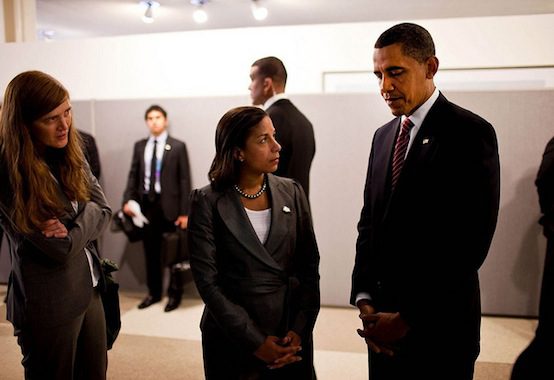Somewhere, Bin Laden Is Smiling

Bowe Bergdahl was “an American prisoner of war captured on the battlefield” who “served the United States with distinction and honor,” asserted Susan Rice, the president’s national security adviser.
Rice was speaking to ABC’s George Stephanopoulos the morning after Barack Obama’s Rose Garden celebration of Bergdahl’s release. When she spoke last Sunday, could Rice have been ignorant of the widespread reports that Bergdahl had deserted?
Before last Sunday, her credibility was already in tatters.
Five days after Ambassador Chris Stevens and three Americans were killed in Benghazi, Rice went on five Sunday shows to describe the terrorist attack as a spontaneous riot ignited by an anti-Muslim video.
Not only has her credibility now suffered a second near-lethal blow, her competence as a presidential adviser is open to question. How could she let the president strut into the Rose Garden to celebrate the release of a soldier whose reported desertion triggered a province-wide search that may have cost the lives of half a dozen American soldiers?
As The Hill reported, a Pentagon investigation in 2010 concluded Bergdahl had walked out on his unit and left a note in his tent saying he was disillusioned with the Army and no longer supported the war. Was Rice ignorant of this? Did she think it not relevant, when she approved the president’s hosting of Bergdahl’s parents in the Rose Garden? Is Rice not responsible for the humiliation President Obama has endured all week and the fiasco that diverted national and international attention from his trip to Warsaw, Brussels and Normandy?
Forty-eight hours after Obama celebrated Bergdahl’s release, the chairman of the Joint Chiefs was promising an investigation of the soldier on the charge of desertion and related allegations he may have defected and collaborated. If Gen. Martin Dempsey was aware an investigation into charges so serious that they carry the death penalty was ahead for Bergdahl, did he not flag the White House before the president went before the nation to celebrate Bergdahl’s return?
Rear Adm. John F. Kirby, the Pentagon spokesman, defends the decision by saying the U.S. military does not leave its soldiers behind: “When you’re in the Navy, and you go overboard, it doesn’t matter if you were pushed, fell or jumped. … We’re going to turn the ship around and pick you up.”
That is America’s tradition, and a proud and honorable one. And no one opposed the effort to bring Bergdahl home.
But if a man jumps overboard, to desert, and half a dozen sailors perish in stormy seas trying to rescue him, the Navy does not welcome the AWOL seaman back aboard with bands playing, all hands on deck and the captain hosting a celebration. The man is put in the brig to face charges on return to port. That is the military ethos Gen. Dempsey rightly praises.
But if Barack Obama, Susan Rice and the White House thought that swapping five senior Taliban commanders for Bergdahl would be cheered, it only testifies to how far removed they are from the band-of-brothers culture of the American military.
Consider the damage this debacle has been done. Our Afghan allies believe that, to retrieve one of our own, we dealt behind their backs with the enemy, at their expense. Are they not right? In return for one U.S. soldier, we traded five hardened Taliban commanders and killers. Their release has proven both a moral and military victory for our enemies, and a moral defeat for our friends. When we are gone from Afghanistan, the Kabul government we leave behind will have to deal with the consequences of what we did.
Second, the trade of the Taliban Five for Bergdahl has ignited a firestorm in the United States, polarized the American people further, proven a political fiasco for the president, and caused a diplomatic nightmare during his trip to Europe to shore up our NATO allies.
Today, circulating around Afghanistan, Pakistan and the Middle East, is a Taliban video of the prisoner exchange, where the Islamist fighters are handing over a pale and nervous American to our troops, and warning him never to return again or face death. Then the video shows the American helicopter flying away.
To those of us of a certain age, that helicopter calls to mind another helicopter, 40 years ago, lifting off the roof of the American embassy in Saigon, leaving behind the first war America lost and the Vietnamese people whose freedom we had gone to war to preserve and protect.
More than a decade ago, George W. Bush, full of hubris and egged on by his neocon counselors, decided to go beyond eradicating al-Qaeda in Afghanistan to remaking that country, and then Iraq, in our image. So, to make the Middle East safe for democracy, we plunged in.
And as we see the future unfolding in Afghanistan and Iraq, and reflect on the costs of our intervention — 7,000 dead, 40,000 wounded warriors, $2 trillion lost — was it all worth it?
Somewhere in hell, Osama bin Laden is smiling.
Patrick J. Buchanan is the author of Suicide of a Superpower: Will America Survive to 2025? Copyright 2014 Creators.com.